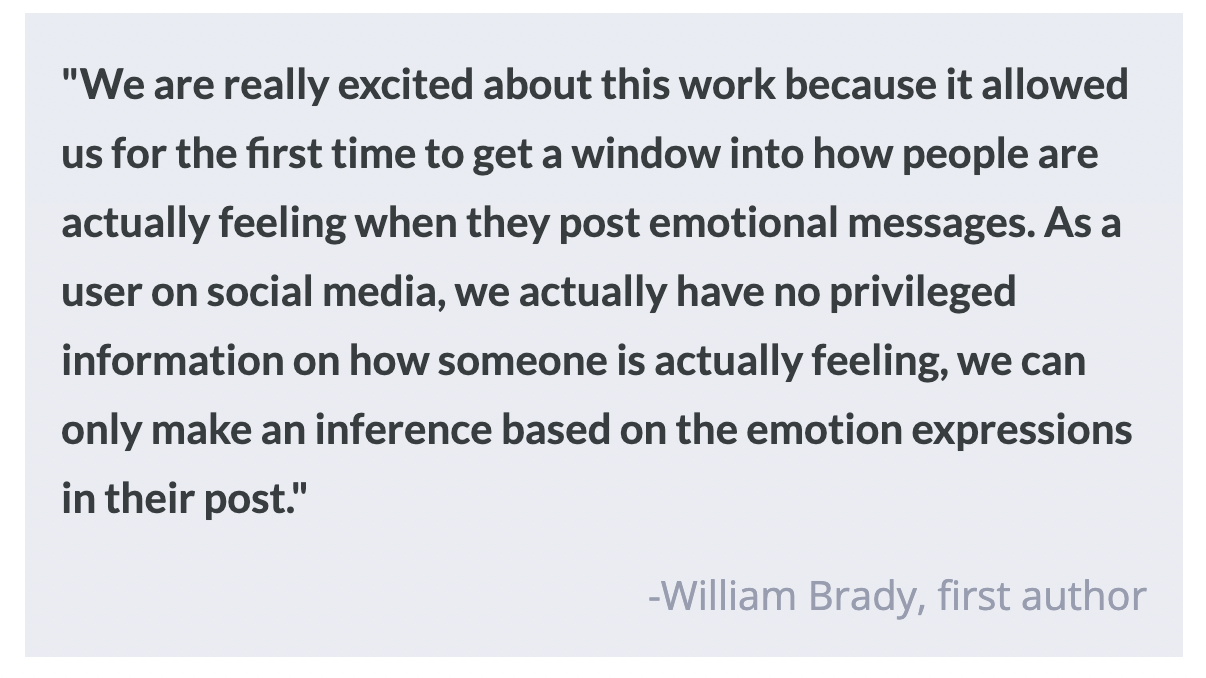Overestimation of Moral Outrage in Twitter Users on Political Topics
Post by Lani Cupo
The takeaway
When people read posts on social media, they are likely to overestimate how much moral outrage the author of the post felt. Further, they are likely to attribute the same level of outrage to a larger group, misperceiving the extent of collective moral outrage.
What's the science?
For a democracy to function, citizens must be able to assess collective moral attitudes, accurately identifying common ground among citizens and understanding what topics are most important to the members of opposing political parties. The use of social media platforms for political conversations can warp and skew social perceptions about the values and opinions of others. It is still unclear how social media, in its current form, might distort perceived outrage among politically-partisan users. This week in Nature, Brady and colleagues examine perceptions of Twitter posts (tweets) to understand how accurately readers can assess moral outrage in the original tweet’s author.
How did they do it?
The authors first conducted a field study using Twitter as a naturalistic study environment. They employed a machine learning algorithm to identify users who often posted high or low levels of outrage while discussing topics in American politics. Then, within 15 minutes of them posting a tweet, the authors invited them to take a survey about how happy or outraged they were while writing the tweet. Then, the authors recruited a separate group of politically-partisan Twitter users to read the tweets and judge how happy or outraged they thought the tweet author was when they wrote the message. In a follow-up study, the authors examined whether overestimating outrage in an individual amplifies the perception of collective moral outrage (i.e. overestimating the outrage of an entire group). To do so, they created two mock Twitter feeds with the tweets from the first experiment that both contained the same amount of outraged tweets based on how the tweet-author rated them, but one feed contained more tweets that were overestimated for outrage (high-overperception feed) and one contained tweets that were not overestimated (low-overperception feed). After exposing different groups of participants to these feeds, they assessed whether they perceived collective outrage to be greater. In a final follow-up study, a new set of participants was shown one of the mock Twitter feeds (either high- or low-overperception) and then asked to assess ten political tweets that contained opinions with either outraged or neutral language. The participants were asked to judge how appropriate the tweet would be in the network they observed, how much they thought the social network they observed liked the opposite political group, and how extreme the network was.
What did they find?
First, the authors found that readers overestimated how outraged the author of the tweet was. Importantly, their ratings correlated with those of the tweet-author (if the tweet-author was slightly outraged, the reader perceived them as outraged), but the reader overestimated the amount of outrage nevertheless. The readers who spent more time on social media to learn about politics were more likely to overestimate outrage, regardless of how politically extreme they were themselves or how strongly they aligned with a political group. Second, in the follow-up experiment, the authors found participants in the high-overperception feed were more likely to judge the collective outrage of their social network as high than those in the low-overperception feed, suggesting that overestimation of social outrage increases the perception of collective outrage. Finally, the authors found the high-overperception network was assessed to be more politically extreme and to dislike their political opponents more. It was also deemed socially acceptable to post tweets with more outrage, showing that overperception of collective outrage altered the perception of social norms in a group.
What's the impact?
This study provides evidence that moral outrage on political topics is overestimated on social media platforms, and this overperception can alter societal expectations in the network. These results provide a foundation to understand how social media may distort social knowledge, especially on controversial political opinions. In time, they may form the basis for countering political antipathy that is amplified on social media platforms.


